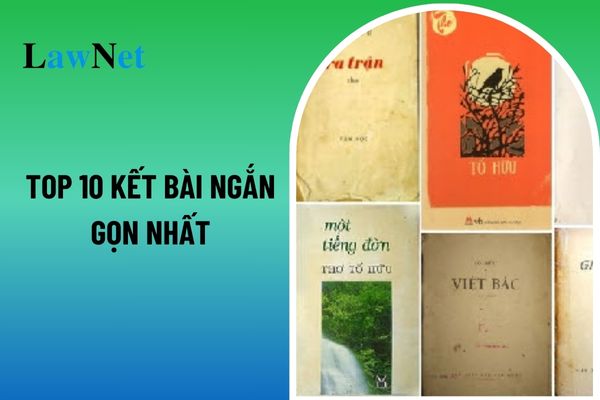What are the sample brief conclusions for an analysis essay on a poetic work for 12th-grade students? In Vietnam, what knowledge does the 12th-grade Literature curriculum cover?
What are the sample brief conclusions for an analysis essay on a poetic work for 12th-grade students in Vietnam?
Below are the top 10 sample brief conclusions for an analysis essay on a poetic work for 12th-grade students in Vietnam:
Sample 1
The poetic work is the author's inner voice, reflecting deep thoughts and emotions about life and humanity. Through the excerpt of the poem, we perceive the value of profound awareness and living responsibly with oneself and society.
Sample 2
Concluding the poem is a profound message to each individual, emphasizing the appreciation of life values while encouraging sincerity and goodness, allowing one to live more fully and meaningfully.
Sample 3
Using subtle language and unique expression artistry, the author conveys messages about life, stirring thoughts about humanism and the relationship between people in modern society.
Sample 4
With meaningful and profound imagery, the poetic work is not just the author's heartfelt expression but also a mirror reflecting each person's life. Through it, the work calls on each of us to live sincerely and optimistically.
Sample 5
The emotions in the poem offer us a humanistic and profound perspective on life, helping us understand that the challenges or difficulties in life are but a small part of the self-development journey.
Sample 6
Each piece of poetry goes beyond expressing the author's emotions to providing a valuable lesson about the eternal values in life, such as love, compassion, and resilience to overcome all challenges.
Sample 7
The poetic work is a multi-dimensional picture of life, allowing the reader to perceive the richness, diversity, and depth of emotions that everyone can experience in their growth journey.
Sample 8
With philosophically rich verses, the work leaves the reader with profound thoughts about life and the events surrounding us, helping us realize the importance of independence and a sense of responsibility.
Sample 9
From simple, familiar poetic images, the work shows us that no matter how difficult life becomes, we must maintain faith and perseverance, as there is an untapped inner strength in every person.
Sample 10
Finally, the poetic work concludes with a reminder that life isn't just about challenges but also joys and hopes. The crucial part is to know how to seize time and opportunities to enrich the soul and live more fully.
Note: The information is for reference purposes only!

What are the sample brief conclusions for an analysis essay on a poetic work for 12th-grade students in Vietnam? In Vietnam, what knowledge does the 12th-grade Literature curriculum cover? (image from the Internet)
In Vietnam, what knowledge does the 12th-grade Literature curriculum cover?
Under Section IV of the Annex on the General education program in Literature issued with Circular 32/2018/TT-BGDDT, the 12th-grade Literature curriculum specifies as follows:
Literature knowledge:
[1] The cognitive, educational, and aesthetic functions of literature
[2] The suitability between themes, ideas, and dominant inspiration
[3] Some manifestations of artistic style in folk literature, medieval literature, modern literature, real-life trends, and romantic tendencies; the artistic style of the author
[4] Some elements of legendary stories, novels (modern and postmodern), modern lyrical poetry, comedy, memoir
- Legendary stories: themes, characters, language, artistic methods; evaluating the role of fantastical elements in legendary stories, referencing their role in ancient folk stories
- Novels (modern and postmodern): language, psychological development, character actions
- Modern lyrical poetry: language, imagery, symbols, elements of symbolism, surrealism
- Comedy: language, characters, situations, satirical methods
- Reportage, diaries or memoirs: non-fictional nature, description, narrative; combining factual details, events with the writer’s experiences, attitudes, and evaluations
[4.1] The psychological development of characters and ways to express the characters' psychology by the writer
[4.2] The relationship between the narrator, and perspective in expressing the theme of the text
[4.4] Basic understandings about Ho Chi Minh to help comprehend some representative works of this author
[4.5] A brief overview of literary history and the role of historical literary knowledge in understanding texts
What are the orientations to teaching methods for 12th-grade Literature in Vietnam?
Under Section 6 of the Annex on the General education program in Literature issued with Circular 32/2018/TT-BGDDT, the orientations to teaching methods for 12th-grade Literature in Vietnam are prescribed as follows:
The Literature curriculum utilizes education methods oriented toward integrated and differentiated teaching; diversifying teaching methods, means, and organizational forms; promoting active, proactive, and creative learning, applying knowledge and skills of students.
- Based on the program, teachers proactively and flexibly build and organize lessons according to the following orientations:
+ Implement intra-disciplinary integration requirements (both knowledge and skills), interdisciplinary integration, and integrate priority education content (cross-disciplinary); implement differentiated teaching according to student subjects at all levels and differentiation contributing to career orientation in high school education.
+ Train students in methods of reading, writing, speaking, and listening; practice, experience in receiving and applying knowledge of the Vietnamese language and literature through learning activities in and out of the classroom; focus on using teaching means, overcoming the traditional reading and copying teaching style, developing thinking, training skillful use of means for students.
+ Enhance and promote student activeness and self-reliance; allocate ample time for students to study textbooks and learning materials, practice, conduct presentations, discussions, and defend learning results to enable students to read, write, speak, and listen according to varying demands and levels; assess and evaluate student task fulfillment in their learning tasks.

